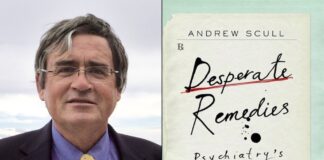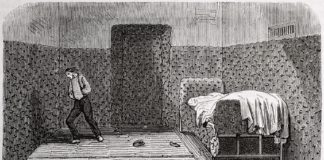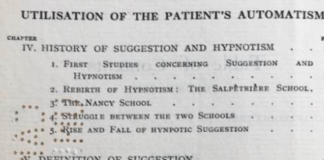Tag: history of psychiatry
“All Real Living Is Meeting”: Brent Robbins on Love, Death, and...
Psychologist and existential thinker Brent Robbins reflects on a lifetime of work, the limits of psychiatric diagnosis, and what facing mortality has taught him about joy and human connection.
Psychiatry’s Cycle of Ignorance and Reinvention: An Interview with Owen Whooley
Ayurdhi Dhar interviews sociologist Owen Whooley about psychiatry's stubborn perseverance in the face of recent DSM embarrassments and the failures of the biomedical model.
Andrew Scull—Desperate Remedies: Psychiatry’s Turbulent Quest to Cure Mental Illness
Sociologist and author Andrew Scull discusses the history of psychiatry's "Desperate Remedies," from lobotomy and the asylum to the failures of today's drugs and the fads of ketamine and deep brain stimulation.
Desperate Remedies
History shows us that the mentally ill are extraordinarily vulnerable to therapeutic experimentation, some particularly brutal and extreme, which continues to the present day.
Psychiatry and the Selves We Might Become: An Interview with Sociologist...
MIA’s Ayurdhi Dhar interviews the well-known sociologist of medicine, Nikolas Rose, about the role psychiatry plays in shaping how we manage ourselves and our world.
Then and Now: Will Psychiatry Ever Change?
In my experience, psychiatry is a discipline in which treatment and gaslighting exist in a complex braid. One side might show more than the other at times, but they’re closely woven together and hard to pick apart.
Building a Culture of Mental Well-Being
We used to turn to family, community, and religious/philosophical teachings to ease our despair. Now, one is expected to turn to psychiatrists and therapists. With depression rates rising throughout the world, modern society must find a way to enhance the individual’s capacity to build a meaningful, satisfying, and self-actualized life.
An “Even-Handed” History of Psychiatry as Damning as the “Polemics”?
Where Professor Harrington's book seems to differ from books that others might call polemics is that she does not attribute nefarious motives to the psychiatric establishment. I worry that she underplays the ways in which the current model causes harm, but I support her suggestion for a retraction of psychiatry's scope.
Stigma and Discrimination Linked to the Biomedical Model of Mental Health
Study traces the history of biomedical explanations of psychopathology to show how stigma and discrimination are reinforced when other possible explanations are ignored.
So What is Mental Disorder? Part 2: The Social Problem
The English Workhouse was designed to deter people from seeking state assistance, and Victorian asylums were designed to care for poor people whose behaviour was disruptive to Workhouse routines. Madness, previously viewed as an interesting, if inconvenient, manifestation of humanity, came to be seen as a social problem in need of correction.
Michael Fontaine: What the Ancient World Can Teach Us About Emotional...
An interview with Professor of classical languages and literature, Michael Fontaine. Michael is Associate Vice Provost of Undergraduate Education at Cornell University in New York. We discuss what Ancient Greece and Rome can teach us about psychiatry and the concept of mental disorders.
Pierre Janet and the History of Psychological Treatments
In this piece for Holistic Elephants, Bernard Guerin discusses Pierre Janet's book Psychological Healing: A Historical and Clinical Study, which describes a variety of mental health...
“The Lobotomy Files: Forgotten Soldiers”
The Wall Street Journal published a large multimedia report on documents revealing a time when the US lobotomized some 2,000 veterans. “Besieged by psychologically...
Study Examines Women’s Experiences of Hearing Voices
An international group of researchers from multiple disciplines has published a historical, qualitative, and quantitative investigation into voice-hearing in women. The interdisciplinary project, freely available from Frontiers in Psychiatry, explores how sexism, exploitation, and oppression bear on women’s’ experiences of hearing voices.
A Square Peg in a Round Hole: The Construction of Depression...
This blog is a review of Gary Greenberg's book, Manufacturing Depression: The Secret History of a Modern Disease. I wrote it originally in 2010, but it was never published. By publishing the review now, I hope it will provide a useful reflection for those who have already read Manufacturing Depression, and an incitement to read the book for those who have not.





















